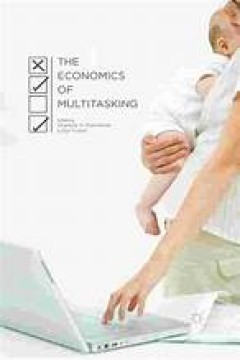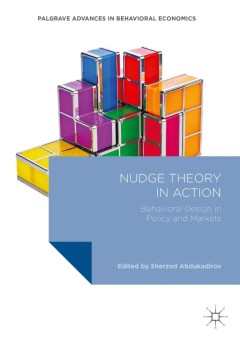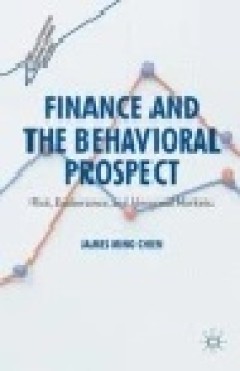Filter by

The Economics of Multitasking
People regularly multitask, though we have been warned about the mental costs of "task-switching" in psychology and the popular press. Meanwhile, economists have remained silent on the possible economic ramifications – both good and bad – of producers and/or consumers doing more than one thing at once. This first-of-its-kind volume explores the frequency, patterns, and economic implications…
- Edition
- 1
- ISBN/ISSN
- 978-1-137-38144-6
- Collation
- XV, 216
- Series Title
- -
- Call Number
- -

Nudge Theory in Action: Behavioral Design in Policy and Markets
This collection challenges the popular but abstract concept of nudging, demonstrating the real-world application of behavioral economics in policy-making and technology. Groundbreaking and practical, it considers the existing political incentives and regulatory institutions that shape the environment in which behavioral policy-making occurs, as well as alternatives to government nudges already …
- Edition
- 1
- ISBN/ISSN
- 978-3-319-31318-4
- Collation
- XIX, 351
- Series Title
- Palgrave Advances in Behavioral Economics
- Call Number
- -

Finance and the Behavioral Prospect
This book explains how investor behavior, from mental accounting to the combustible interplay of hope and fear, affects financial economics. The transformation of portfolio theory begins with the identification of anomalies. Gaps in perception and behavioral departures from rationality spur momentum, irrational exuberance, and speculative bubbles. Behavioral accounting undermines the rational p…
- Edition
- -
- ISBN/ISSN
- 978-3-319-32711-2
- Collation
- XII, 343
- Series Title
- Quantitative Perspectives on Behavioral Economics and Finance
- Call Number
- -

Integrating Human Capital with Human Development The Path to a More Producti…
For the most part, human capital theory emphasizes human cognitive development and the acquisition of knowledge and skills that enable enhanced productivity and earnings. In light of recent research findings, particularly concerning neurodevelopment and early childhood development, it is becoming apparent that this standard version of human capital theory has a far too limited conception of hum…
- Edition
- -
- ISBN/ISSN
- 978-1-137-45674-8
- Collation
- -
- Series Title
- -
- Call Number
- -

New Perspectives for Environmental Policies Through Behavioral Economics
This book presents essential insights on environmental policy derived from behavioral economics. The authors demonstrate the potential of behavioral economics to drive environmental protection and to generate concrete proposals for the efficient design of policy instruments. Moreover, detailed recommendations on how to use “nudges” and related instruments to move industry and society toward…
- Edition
- 1
- ISBN/ISSN
- 978-3-319-16792-3
- Collation
- XI, 335
- Series Title
- -
- Call Number
- -

The Paradox of Points: Theoretical Foundation and Empirical Evidence of Mediu…
In his research, Sören Köcher provides valuable insights on the paradoxical effects of the magnitude of a loyalty program medium—i.e. the sheer number of points, miles, or stamps credited for every purchase and required for reward redemption—on the central consumer decisions in loyalty program memberships. In sum, the results of twelve empirical studies reveal that high magnitude currenci…
- Edition
- -
- ISBN/ISSN
- 978-3-658-09543-7
- Collation
- XIX, 163
- Series Title
- Applied Marketing Science / Angewandte Marketingforschung
- Call Number
- -

Understanding Auctions
In recent years, auctions have become an important field and many markets have designed new and sophisticated auction models to assign different types of items. The prime goal of this book is to set an organized classification of the main auction mechanisms in a way that readers can understand the importance of auction design and the advantages and drawbacks of each model. Given the relevance o…
- Edition
- -
- ISBN/ISSN
- 978-3-319-08813-6
- Collation
- 18 illustrations in colour
- Series Title
- -
- Call Number
- -

Advances in Happiness Research: A Comparative Perspective
This edited volume makes a contribution to the literature on happiness research by compiling studies based on cross-national research and from diverse academic disciplines. The book is distinctive in that it contains both theoretical and empirical analyses, investigating relationship between causes of happiness and economic behavior relating to employment, consumption, and saving. Most notably,…
- Edition
- Ed. 1
- ISBN/ISSN
- 978-4-431-55753-1
- Collation
- XX, 344
- Series Title
- Creative Economy
- Call Number
- 330.07 ADV a

Experimental Econophysics
Experimental Econophysics describes the method of controlled human experiments, which is developed by physicists to study some problems in economics or finance, namely, stylized facts, fluctuation phenomena, herd behavior, contrarian behavior, hedge behavior, cooperation, business cycles, partial information, risk management, and stock prediction. Experimental econophysics together with empiri…
- Edition
- -
- ISBN/ISSN
- 978-3-662-44234-0
- Collation
- 40 b/w illustrations, 35 illustrations in colour
- Series Title
- -
- Call Number
- -

Experimental Economics Volume II: Economic Applications
How do applications affect behavior? Experimental Economics Volume II seeks to answer these questions by examining the auction mechanism, imperfect competition and incentives to understand financial crises, political preferences and elections, and more.
- Edition
- -
- ISBN/ISSN
- 978-1-137-53816-1
- Collation
- XVIII, 220
- Series Title
- -
- Call Number
- -
 Computer Science, Information & General Works
Computer Science, Information & General Works  Philosophy & Psychology
Philosophy & Psychology  Religion
Religion  Social Sciences
Social Sciences  Language
Language  Pure Science
Pure Science  Applied Sciences
Applied Sciences  Art & Recreation
Art & Recreation  Literature
Literature  History & Geography
History & Geography